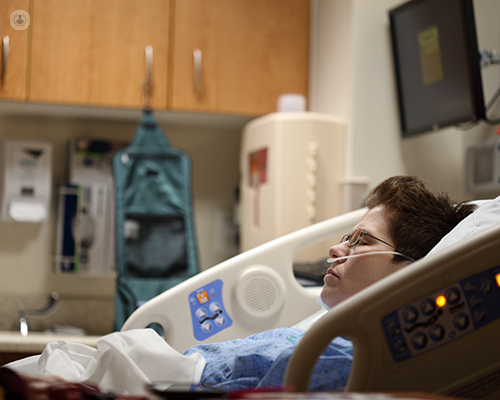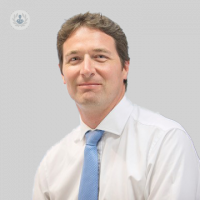What happens before, during and after DIEP flap breast reconstruction surgery?
Written by:Women who have had a mastectomy will often require some form of breast reconstruction surgery. Many are now opting for a procedure called Deep Inferior Epigastric Perforator (DIEP) flap surgery over breast implants due to their longer-term benefits. In the second of three articles Mr Kelvin Ramsey - an expert plastic surgeon who has performed more than 500 DIEP flap operations – explains what happens before the procedure, what happens on the day of surgery, and what to expect immediately after the surgery is completed.

What happens before the operation?
Ahead of the scheduled procedure, your surgeon will have several consultations with you, during which all of the different reconstructive options will be discussed at length. If it is decided that the DIEP is suitable, you will undergo a CT angiogram which scans the blood vessels in the abdomen. This tells the surgeon what the likelihood is of injury to the rectus (abdominal muscle) at the time of surgery. In the majority of cases this is avoided.
Patients who smoke need to stop at least a month before undergoing this surgery to reduce chances of any post-operative complications. On the day of surgery, patients should bring with them a nightdress, gown and toiletries, as well as a non-wired bra. After the procedure, a hole is usually cut in the bra to allow easy examination of the DIEP flap in the days after surgery.
Your surgeon may also arrange other pre-operative tests in the week prior to surgery, depending on your individual case.
What happens on the day of surgery?
On arrival at the hospital, the nurses will run through a number of checks and get you ready for the operation.
Patients can also expect a visit from the anaesthetist to discuss how the general anaesthetic will be administered and what to expect from it.
Lastly, the surgeon will run through the details of the surgery once again, you will sign the consent form and your surgeon may also draw some lines to guide the surgery.
As this procedure is a major surgery involving general anaesthetic, a hospital stay of four to five days is necessary. There are also several measures to expect that help with recovery and comfort:
- A urinary catheter to drain urine for the first 24 hrs after the procedure.
- Drains in the breast and abdomen to drain fluid, which are removed in the first few days after surgery.
- Intravenous antibiotics are administered in the first 48 hours to reduce the likelihood of a post-operative infection.
- Blood-thinning injection to reduce chances of deep vein thrombosis.
What happens when I wake up from the operation?
When you wake up from surgery it is normal to feel drowsy and disorientated as the anaesthesia wears off. Your breast(s) will also feel a little bit sore after surgery, especially with upper body movement. You will be positioned so that your knees are bent over a cushion which helps to take the strain off the abdominal wound. Sufficient pain relief will be provided to ensure that you are comfortable.
If you have had a mastectomy and are considering breast reconstruction surgery, talk to a specialist to discuss your options.


